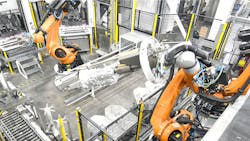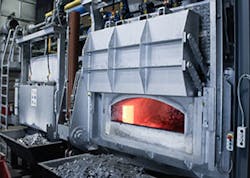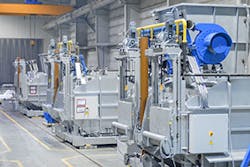The springtime naturally promotes images of revival, new beginnings, and growth, so metalcasters may be forgiven for seeing another cycle of renewal springing from their automotive industry customers. It’s real, and it’s prompting new foundry projects in the Midwest, still the home base for North American automaking, and in the Southeast, where numerous foreign automakers have set up their manufacturing activities.
General Motors must lead any list of foundry expansion projects, and since the start of this year the automaker has announced two: its aluminum foundry complex at Saginaw, MI, will be the site of a $50-million project resulting in a new casting operation for driveline system parts. The Michigan plant currently casts aluminum engine blocks and cylinder heads in different configurations using green sand molding, lost foam casting, precision sand casting; a United Auto Workers union official has said the changes would involve a new casting process, though GM has deferred offering details.
At Bedford, IN, GM announced it would invest $127.4 million to update the aluminum casting operations for powertrain and structural components. The automaker did not detail the improvements, nor the timetable for the project, which it said would be released at some future date.
Richmond, IN, is the site of a plant revamp being carried out by Omen USA, a subsidiary of Omen Casting Group, which has aluminum diecasting operations in Israel, Portugal, and Russia. It plans to invest $16 million to refurbish a 76,000-sq.-ft. plant where it will produce aluminum high-pressure diecastings for drivelines, steering components, and oil pumps. These will be supplied to domestic and European automaking customers.
A further $7 million would be invested in the operation by 2021. Omen USA expects to employ up to 100 by 2019.
A zinc diecasting operation aiming to produce automotive safety system parts (e.g., steering locks, starter switches) has set up in Rockford, IL. Taurus Die Casting LLC reportedly will invest $6.4 million in a 44,000-ft2 plant, where it will employ 37 full-time workers, including diecasting and CNC finishing machine operators.
More expansive investments are taking place in North Carolina. With an initial investment of $100 million, construction starts this year for the GF Linamar LLC automotive aluminum diecasting and machining plant in Henderson County, NC. In 2017, it will start producing powertrain, driveline, and structural components. Partners GF Automotive and Linamar Corp. announced their project last July, and reported their location late in February.
The location is about 40 miles from Greenville, SC, where BMW US Manufacturing Co. assembles cars and SUVs. South Carolina also will be home to a new Volvo Car USA LLC plant, and other foreign automakers have assembly plants across the Southeast states. The joint-venture partners made it clear in their initial announcement that the new plant would supply a “European car maker.”
Ideal Location
“The location is ideal for us and we look forward to a prosperous future for our joint venture in the U.S.,” according to Yves Serra, CEO of GF. The 57-acre development will draw financial support from a state and local development agencies, some of which funding will be scaled to match job-creation goals.
GF Automotive is a business unit of Switzerland-based GF, the organization formerly known as Georg Fischer Ltd. The automotive business produces ferrous castings at plants in Austria, Germany, and China, and aluminum and magnesium diecastings in Austria and China.
The other partner is Ontario-based Linamar, which has two operating segments: Powertrain/Driveline and Industrial. Recently, it completed a $875-million takeover of Montupet S.A., an aluminum automotive foundry group with seven plants in Europe and Mexico. Those operations will be added to the group’s steel forging, machining, and other operations as Linamar expands its automotive powertrain and driveline business.
“This will be our fourth plant in North Carolina, an area where we have thrived thanks to a fantastic workforce and a great business environment,” commented Linda Hasenfratz, CEO of Linamar. “It is rapidly becoming an important hub for us to serve our customers in the southern U.S. and North America overall.”
In March, KSM Castings USA in Shelby, NC, announced an $80-million expansion plan, its second expansion in the two years since opening. The plant currently produces aluminum high-pressure diecastings for automotive transmissions, but future production programs are driving the adoption of new casting technology in the upcoming project.
Starting this year, a new, 50,000 sq. ft. building will be added to the site to house counter-pressure casting (CPC) machines. The initial $27-million investment will cover the construction costs and the first production equipment. The capital investment is forecast to total $80 million by 2022 as the CPC program grows, in new construction and the first production machines for CPC processes. Overall, KSM will invest $80 million and hire 80 new employees between now and 2022 to support CPC processes.
In contrast to standard high-pressure diecasting, CPC allows the manufacturer to adjust the pressures of the furnace and the mold independently. The high cooling rate of the material is another difference. KSM claimed these factors recommend CPC for casting parts with high static and dynamic load factors, such as chassis components. According to its announcement, KSM will begin manufacturing and supplying chassis parts to an unnamed German automaker in 2018.
“With the expansion of this site we will continue with our strategy to be on-site, offer different production processes for our customers, and supply the local markets,” according to Franz Friedrich Butz, CEO of the KSM Castings Group.
Currently, the employment total is 128. When the new project is completed, KSM’s total investment at the Shelby site is projected to be $135 million, with 269 employees at that location.
KSM Castings NC Inc. was founded in 2012, with plant construction beginning in 2013. The project was completed in May 2014, centering on two 750-metric ton machines and one 900-mt machine. The highly automated operation also includes melting, controlled cooling, deburring, parts cleaning, and finish machining operations.
In the summer of 2015, three more diecasting machines with clamping forces of 3,000 mt and 1,350 mt were installed to produce transmission housings and internal transmission parts.
Proximity to Customers
In addition to a high degree of robotic automation, KSM emphasizes its proximity to customers as part of its customer service and expansion strategy. Since the most recent expansion last year, the plant has supplied 18,500 transmission parts per week to ZF Transmissions, KSM noted.
The expansion is being aided by a performance-based grant of up to $320,000 from the One North Carolina Fund — a program that credits manufacturers once agreed capital investment and employment targets have been reached. “KSM’s rapid growth in Cleveland County underscores the continued success of automotive components manufacturing across North Carolina,” stated North Carolina Governor Pat McCrory. “The expansion by this major automotive supplier keeps that momentum going.”
In addition to the North Carolina operation, the KSM Castings Group, Wuppertal, Germany, has six diecasting, low-pressure sand casting, and permanent mold foundries in Germany, Czech Republic, and China, producing a range of automotive structural, chassis, and powertrain components in aluminum and magnesium alloys. Volkswagen, Bentler, ZF, Daimler, and Bosch have been reported among its automotive customers.
The onetime ThyssenKrupp business unit is now a wholly owned subsidiary of acquired by China's CITIC Dicastal Manufacturing Co. Ltd. (a manufacturer of automotive wheels.)
In addition to the addition of counter-pressure casting, KSM is working together with local educational institutions to develop a training center for robotics technology. Also, KSM has opened an engineering office in the Detroit area together with CITIC Dicastal. “The proximity to General Motors, Chrysler, and Ford was decisive for the site selection. At this location we will develop, construct and optimize products directly on site and together with our customers,” the CEO stated.
Another CITIC holding is establishing an aluminum automotive wheel casting operation in Greenville, MI. Diecastal North America Inc. was announced in September 2014 as a $140-milion revamp and restart for a former photovoltaic systems plant. It plans to produce 3 million aluminum alloy wheels annually there, enlarging the existing manufacturing space by 100,000 sq.ft. to accommodate its operation. It has indicated it would hire up to 300 workers over four years. Diecastal North America received an $8.5-million incentive package from local and state sources, and separately it took advantage of $1.5 million in state aid to hire and train workers.
Recently, it selected StrikoWestofen to supply its aluminum melting process technology. The StrikoWestofen Asia subsidiary is delivering three StrikoMelter furnaces for the Michigan plant, which the supplier noted will achieve “energy-efficient melting systems with low metal loss.”
The StrikoMelter is a shaft furnace design with a patented system (ETAmax) that combines charge preheating, heating, and melting phases efficiently in a single melting channel (or “shaft”). As metal returns and ingots are melted in the lower section, the combustion gases preheat the new charge material in the shaft area above it.
Molten metal is transferred to the holding bath, without turbulence, the designer emphasized, which reduces waste and maintains a preset holding temperature with accuracy. According to StrikoWestofen, the recuperative concept is simple and effective, providing significant savings in fuel consumption and reductions in metal loss.
Dicastal installed three StrikoMelter furnaces at its plant in Ningbo, in China’s Zhèjiāng, in 2013.
StrikoDynarad, in Zeeland, MI, will provide extended technical maintenance and spare parts for the three furnaces.
“The main factors influencing the decision were the efficient use of energy, the minimal metal loss and the extremely low emission values,” according to Rainer Erdmann, managing director for StrikoWestofen Asia. The high system availability and the option of recycling aluminum chips independently, for maximum metal yield and furnace productivity, also were decisive factors.
About the Author
Robert Brooks
Content Director
Robert Brooks has been a business-to-business reporter, writer, editor, and columnist for more than 20 years, specializing in the primary metal and basic manufacturing industries. His work has covered a wide range of topics, including process technology, resource development, material selection, product design, workforce development, and industrial market strategies, among others.


